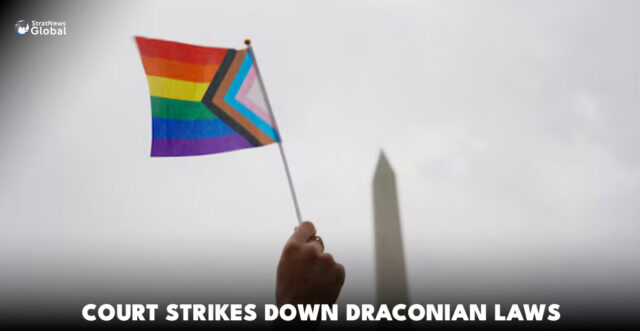Caribbean LGBTQ+ activists this week celebrated a landmark court ruling in Saint Lucia that struck down colonial-era laws criminalising same-sex relations, which earlier carried prison terms of up to 10 years.
The Eastern Caribbean Supreme Court issued the decision on Tuesday in the case brought by LGBTQ rights alliance ECADE on behalf of a gay couple.
‘Incompatible With Human Dignity’
The court ruled that sections of the criminal code that outlawed “buggery” and “gross indecency” were unconstitutional.
“Our own courts are now recognizing that these colonial-era laws are incompatible with human dignity,” Dane Lewis, regional program manager at rights group CariFLAGS, said.
Many Caribbean countries still have laws forbidding intimacy between people of the same sex, a legacy of British colonial-era statutes. Though rarely enforced, activists say these cement widespread institutional biases and discrimination.
‘Momentous Legal Change’
Jessica St. Rose, founder of local rights group 758Pride, said the ruling marked a “momentous legal change.”
“It sends a clear message that love is not a crime,” she said, though Saint Lucia still needs reforms to protect LGBTQ people from discrimination and threats to their safety.
Saint Lucian politicians were mostly silent about the decision publicly, including Prime Minister Philip Pierre who made a national address ahead of Friday’s Emancipation Day.
In nearby Guyana, where “buggery” is a felony subject to a lifetime behind bars, rights group Guyana Together welcomed that another country in the CARICOM regional bloc had “dismantled these archaic laws.”
More than 60 countries worldwide criminalize gay sex, many former British colonies across Africa and the Caribbean.
There was some criticism on social media from Saint Lucia residents of the decision, some citing Christian scripture and calling the ruling a sin.
“We do expect the religious society to come out to speak out against the recent ruling,” St. Rose said.
Hope
Bradley Desir, a gay man from Saint Lucia who moved to Canada in 2016, said he was encouraged by signs of change and would feel safer visiting the island though he would still maintain his guard.
“I hope they carry on with the discussion and possibly call for the legalization of (gay) marriage,” he said, adding he did not expect this in his lifetime.
The growing visibility of LGBTQ people through global media was a positive sign, he added: “Kids today are growing up in a different world.”
(With inputs from Reuters)





